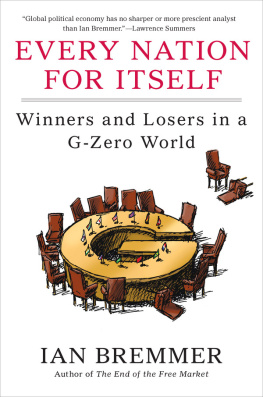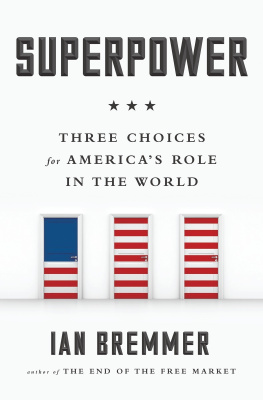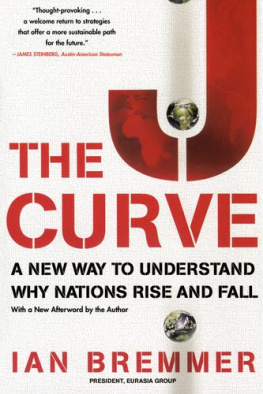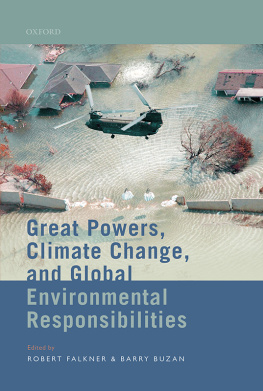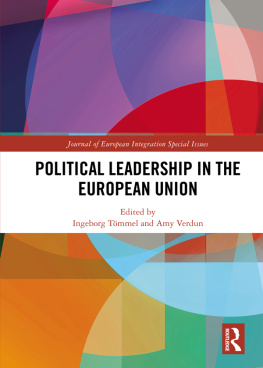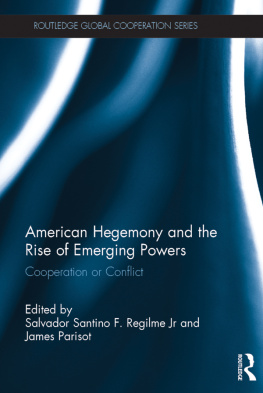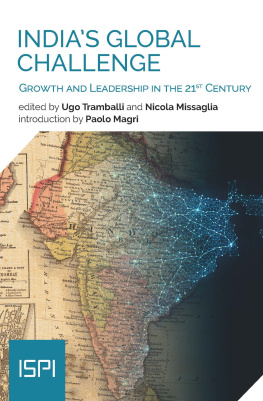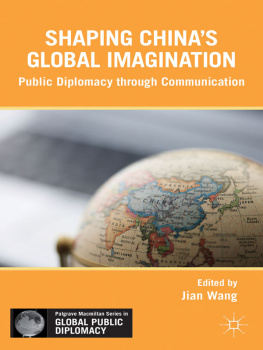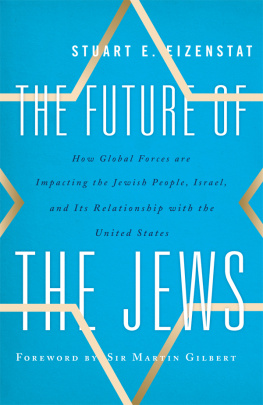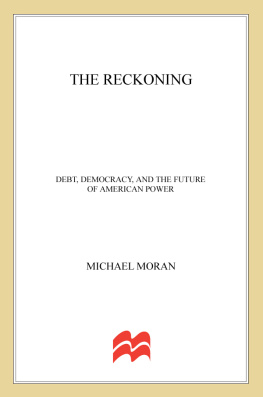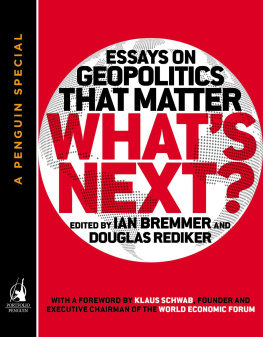A LSO BY I AN B REMMER
The End of the Free Market: Who Wins the War Between States and Corporations?
The Fat Tail: The Power of Political Knowledge for Strategic Investing (with Preston Keat)
The J Curve: A New Way to Understand Why Nations Rise and Fall
Managing Strategic Surprise: Lessons from Risk Management and Risk Assessment (with Paul Bracken and David Gordon)
New States, New Politics: Building the Post-Soviet Nations (with Raymond Taras)
Nations and Politics in the Soviet Successor States (with Raymond Taras)
Soviet Nationalities Problems (with Norman Naimark)
EVERY NATION FOR ITSELF
Winners and Losers in a G-Zero World
I AN B REMMER
Portfolio / Penguin
PORTFOLIO / PENGUIN
Published by the Penguin Group
Penguin Group (USA) Inc., 375 Hudson Street, New York, New York 10014, U.S.A.
Penguin Group (Canada), 90 Eglinton Avenue East, Suite 700, Toronto, Ontario, Canada M4P 2Y3 (a division of Pearson Penguin Canada Inc.)
Penguin Books Ltd, 80 Strand, London WC2R 0RL, England
Penguin Ireland, 25 St. Stephens Green, Dublin 2, Ireland (a division of Penguin Books Ltd)
Penguin Books Australia Ltd, 250 Camberwell Road, Camberwell, Victoria 3124, Australia (a division of Pearson Australia Group Pty Ltd)
Penguin Books India Pvt Ltd, 11 Community Centre, Panchsheel Park, New Delhi110 017, India
Penguin Group (NZ), 67 Apollo Drive, Rosedale, Auckland 0632, New Zealand (a division of Pearson New Zealand Ltd)
Penguin Books (South Africa) (Pty) Ltd, 24 Sturdee Avenue, Rosebank, Johannesburg 2196, South Africa
Penguin Books Ltd, Registered Offices:
80 Strand, London WC2R 0RL, England
First published in 2012 by Portfolio / Penguin,
a member of Penguin Group (USA) Inc.
Copyright Ian Bremmer, 2012
All rights reserved
Library of Congress Cataloging-in-Publication Data
Bremmer, Ian, 1969
Every nation for itself : winners and losers in a G-zero world / Ian Bremmer.
p. cm.
Includes bibliographical references and index.
ISBN 978-1-101-56051-8
1. Economic development. 2. International cooperation. 3. World politics. 4. Leadership. I. Title.
HD82.B6917 2012
330.9dc23
2011052900
No part of this book may be reproduced, scanned, or distributed in any printed or electronic form without permission. Please do not participate in or encourage piracy of copyrighted materials in violation of the authors rights. Purchase only authorized editions.
While the author has made every effort to provide accurate telephone numbers, Internet addresses, and other contact information at the time of publication, neither the publisher nor the author assumes any responsibility for errors, or for changes that occur after publication. Further, publisher does not have any control over and does not assume any responsibility for author or third-party Web sites or their content.
to ann and rob (and moose)
CONTENTS
INTRODUCTION
G-Zero\JEE-ZEER-oh\ n
A world order in which no single country or durable alliance of countries can meet the challenges of global leadership.
O ne beautiful Napa Valley evening in October 2011, I found myself in conversation with Paul Martin, the man who created the G20the forum where nineteen countries plus the European Union bargain over solutions to pressing international challenges. I had just given a speech arguing that the G20 is an unworkable institution, liable to create as many problems as it solves.
As Canadas finance minister from 1993 to 2002 and then prime minister from 2003 to 2006, Martin had irked his countrys allies by declaring that Western dominance of international financial institutions was on the wane. He argued that the world needed a club that welcomed new members from among the leading emerging powers. Officials in Washington, Western Europe, and Tokyo had politely ignored Martins ideauntil the 2008 financial crisis forced them to admit he might have a point. Three years later, the G20 was a fixture of international politics.
Martin and I began a good-natured debate. I argued, as I had in my speech, that the G20 is more aspiration than organization, that twenty is too many, and that there is too little common ground for substantive progress on important issues except under the most extreme conditions. Martin countered that the G20 gives more countries than ever a stake in the success of the global economy and in resolving the worlds political and security challenges.
Then the conversation took an unexpected turn. Martin explained that his early advocacy for the G20 was based less on a vision of global governance than on what was best for Canada. His country had long been a member of the G7a privileged position, to be sure, but within an increasingly irrelevant organization. By arguing for the acceptance of a trend he considered inevitable, Martin believed that Canada could exchange its first-class seat on a sinking ship for a secure spot on a bigger boat. And by leading the effort to build that boat he also hoped to win his country valuable new friends. Like every other delegation present, Canada had its own reasons for being there.
Later that evening, as I replayed our conversation in my mind, I found myself imagining an enormous poker table where each player guards his stack of chips, watches the nineteen others, and waits for an opportunity to play the hand he has been dealt. This is not a global order, but every nation for itself. And if the G7 no longer matters and the G20 doesnt work, then what is this world we now live in?
***
For the first time in seven decades, we live in a world without global leadership. In the United States, endless partisan combat and mounting federal debt have stoked fears that Americas best days are done. Across the Atlantic, a debt crisis cripples confidence in Europe, its institutions, and its future. In Japan, recovery from a devastating earthquake, tsunami, and nuclear meltdown has proven far easier than ending more than two decades of political and economic malaise. A generation ago, these were the worlds powerhouses. With Canada, they made up the G7, the group of free-market democracies that powered the global economy. Today, they struggle just to find their footing.
Not to worry, say those who herald the rise of the rest. New technologies and Americas emergence lifted the global economy between 1870 and the onset of World War I. Americas leadership, Europes reconstruction, cheap oil, and the rise of Asian exports drove growth from the end of World War II into the 1970s. And we can count on increasingly dynamic markets in China, India, Brazil, Turkey, and other emerging nations to fuel the worlds economic engine for many years to come. Americans and Europeans can take comfort, were told, that other states will do a larger share of the heavy lifting as our own economic engines rattle forward at a slower pace.
But in a world where so many challenges transcend bordersfrom the stability of the global economy and climate change to cyberattacks, terrorism, and the security of food and waterthe need for international cooperation has never been greater. Cooperation demands leadership. Leaders have the leverage to coordinate multinational responses to transnational problems. They have the wealth and power to persuade governments to take actions they wouldnt otherwise pursue. They pick up the checks that others cant afford and provide services no one else will pay for. On issue after issue, they set the international agenda. These are responsibilities that America is increasingly unwilling, and incapable, of assuming. At the same time, the rising powers arent yet ready to take up the slack, because their governments must focus on managing the next critical stages of their own economic development.

